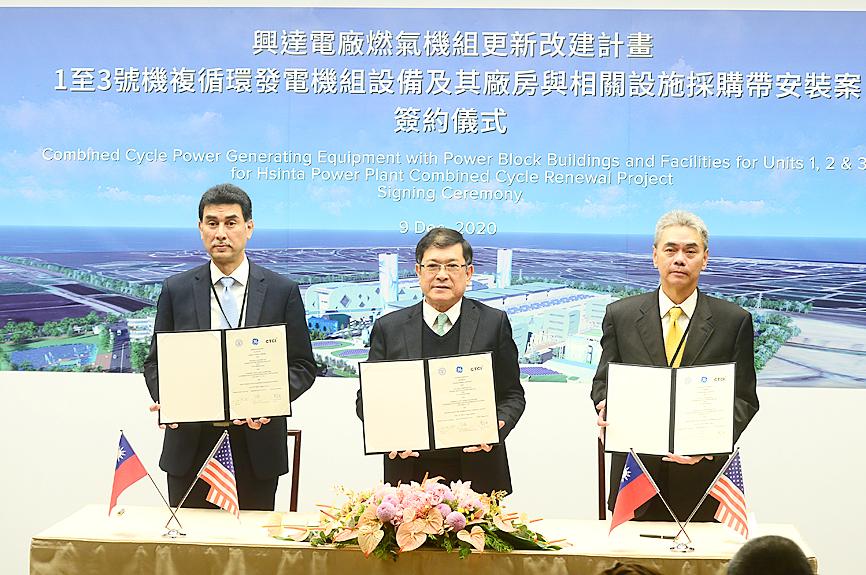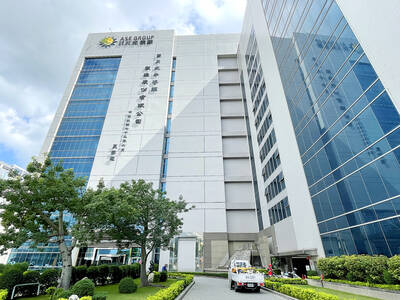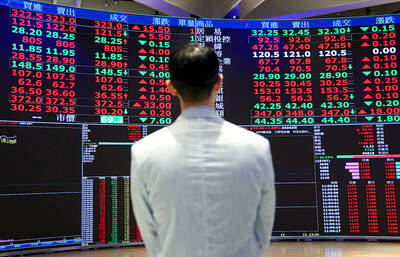Taiwan Power Co (Taipower, 台電) has purchased five new natural gas power generators from General Electric Co (GE) that would add 6.5 million kilowatts to Taiwan’s power capacity, a 16.2 percent boost, the state-run company said yesterday.
Three of the five units would be installed at the Sinda Power Plant in Kaohsiung, while two would be added to the Taichung Power Plant, Taipower said.
The combined cycle generators feature a gas turbine and a steam turbine to generate “up to 50 percent more electricity from the same fuel than a traditional simple-cycle plant,” the GE Web site said.

Photo: Wang Yi-sung, Taipei Times
A signing ceremony was held in Taipei yesterday, with the companies participating in the project represented by Taipower chairman Yang Wei-fuu (楊偉甫), GE Gas Power Asia Pacific president and CEO Ramesh Singaram and Michael Yang (楊宗興), chairman of CTCI Corp (中鼎工程), the construction partner in the projects.
“After attracting bids from manufacturers all over the world, we have chosen GE to supply our gas generator units because of their exceptional efficiency,” Yang Wei-fu said.
With costs totaling NT$100 billion (US$3.51 billion), “this is the largest natural gas generator purchase in the world in 2020,” Yang added.
“This purchase is in line with the government’s policy of increasing natural gas and decreasing coal consumption. It will also ensure future power stability while maintaining air quality,” he said.
Preparation for the installation of the units has begun at the Sinda Power Plant, with the first generator scheduled to produce electricity by 2024, with the two others at the plant projected to go online a year later, Taipower said.
However, the Taichung City Government has yet to grant permission for the two new units at the plant in the city, Yang Wei-fu said, calling on the city government to expedite the process.
“We need their help to ensure the stability of our future power supply,” he said.
The new gas-fired generators would allow the company to retire the aging No. 1 and No. 2 coal-fired generators at the Sinda Power Plant, Taipower manager Chang Ting-shu (張廷抒) said.
‘CLEANER THAN COAL’
“Comparatively speaking, natural gas is cleaner than coal,” Chang said. “We will be able to take out the oldest, dirtiest coal-burning plants while ensuring our power supply.”
There are no plans to retire coal-fired generators in Taichung, as the generators at the powerplant are newer, he said, adding that NT$9 billion has been spent to make the Taichung units “less polluting.”
“Hopefully, when the new Taichung units are up and running, we can reduce the use of the coal-fired plants, but we will keep them operational as peaker [peak-season] plants,” Chang said.
Installation of the Taichung units could be completed as early as 2024, pending approval.
“The ball is not in our court,” Chang said.

EXPANSION: The investment came as ASE in July told investors it would accelerate capacity growth to mitigate supply issues, and would boost spending by 16 percent ASE Technology Holding Co (ASE, 日月光投控), the world’s biggest chip assembly and testing service provider, yesterday said it is investing NT$17.6 billion (US$578.6 million) to build a new advanced chip packaging facility in Kaohsiung to cope with fast-growing demand from artificial intelligence (AI), high-performance-computing (HPC) and automotive applications. The new fab, called K18B, is to commence operation in the first quarter of 2028, offering chip-on-wafer-on-substrate (CoWoS) chip packaging and final testing services, ASE said in a statement. The fab is to create 2,000 new jobs upon its completion, ASE said. A wide spectrum of system-level chip packaging technologies would be available at

Taiwan’s foreign exchange reserves hit a record high at the end of last month, surpassing the US$600 billion mark for the first time, the central bank said yesterday. Last month, the country’s foreign exchange reserves rose US$5.51 billion from a month earlier to reach US$602.94 billion due to an increase in returns from the central bank’s portfolio management, the movement of other foreign currencies in the portfolio against the US dollar and the bank’s efforts to smooth the volatility of the New Taiwan dollar. Department of Foreign Exchange Director-General Eugene Tsai (蔡炯民)said a rate cut cycle launched by the US Federal Reserve

HEAVYWEIGHT: The TAIEX ended up 382.67 points, with about 280 of those points contributed by TSMC shares alone, which rose 2.56 percent to close at NT$1,400 Shares in Taiwan broke records at the end of yesterday’s session after contract chipmaker Taiwan Semiconductor Manufacturing Co (TSMC, 台積電) hit a fresh closing-high amid enthusiasm toward artificial intelligence (AI) development, dealers said. The TAIEX ended up 382.67 points, or 1.45 percent, at the day’s high of 26,761.06. Turnover totaled NT$463.09 billion (US$15.22 billion). “The local main board has repeatedly hit new closing highs in the past few sessions as investors continued to embrace high hopes about AI applications, taking cues from a strong showing in shares of US-based AI chip designer Nvidia Corp,” Hua Nan Securities Co (華南永昌證券) analyst Kevin Su

Nvidia Corp’s major server production partner Hon Hai Precision Industry Co (鴻海精密) reported 10.99 percent year-on-year growth in quarterly sales, signaling healthy demand for artificial intelligence (AI) infrastructure. Revenue totaled NT$2.06 trillion (US$67.72 billion) in the last quarter, in line with analysts’ projections, a company statement said. On a quarterly basis, revenue was up 14.47 percent. Hon Hai’s businesses cover four primary product segments: cloud and networking, smart consumer electronics, computing, and components and other products. Last quarter, “cloud and networking products delivered strong growth, components and other products demonstrated significant growth, while smart consumer electronics and computing products slightly declined,” compared with the